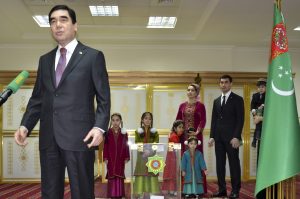Turkmen President Gurbanguly Berdimuhamedov this week appointed his son, Serdar, deputy prime minister and chairman of the Supreme Control Chamber, as well as making him a member of the State Security Council. Speaking at a meeting with top officials, Berdimuhamedov said his son would be in charge of innovative technologies.
The younger Berdimuhamedov, 39, is on a clear trajectory to the top in a country with no political competition to speak of. Naturally, the assumption is the elder Berdi, now 63, intends his son to take over at some point in the future.
Serdar had been appointed head of the newly established ministry for construction and industry in February 2020. The previous year, in June 2019 he was promoted to governor of Ahal province, six months after being appointed deputy governor in January 2019. Before that, Serdar had been serving as a deputy foreign minister since March 2018, after holding the chairmanship of the parliament’s legal affairs committee starting in March 2017. In 2016 he gained a seat in Turkmenistan’s parliament in snap elections and led the foreign ministry’s international information department.
He’s also apparently a lieutenant colonel in an unknown branch of the Turkmen military, has a Ph.D. from the Turkmen Academy of Sciences, studied at the Diplomatic Academy of the Ministry of Foreign Affairs of the Russian Federation, and spent time as a counselor at the Turkmen mission to the U.N. in Geneva.
It would be an impressive resume if each step didn’t include the caveat that nearly every appointment was made directly by his father (and the others indirectly).
Given his latest appointment, the assumption remains strong that Serdar’s headed for the very top. The Turkmen government, notably, does not have a prime minister, meaning that in his new post as one of the “deputy prime ministers,” he will report directly to his father.
Turkmenistan’s chief executive body is called the Cabinet of Ministers. The positions within it are called in English deputy prime ministers, deputy chairmen, or sometimes vice presidents, and are ministers of various topline cabinet ministries. None of the terms fully fits. For example, Rasit Meredow has been minister of foreign affairs of Turkmenistan since 2001, a position in the cabinet. He was reportedly made the top deputy chairman of the cabinet in 2007, a position akin to a “first vice president,” but makes the most headlines as foreign minister. If all that sounds confusing, that’s because it is.
It is not clear from the current reporting whether Serdar is replacing any of the present deputy prime ministers or is joining in a new bespoke slot. Both the AP and RFE/RL reported Serdar as simply being appointed “deputy prime minister.”
In any case, the position — whatever it actually is — is a further elevation of Serdar. Serdar, RFE/RL noted, is often called “the son of the nation” in state media.
Turkmenistan isn’t scheduled to hold presidential elections until 2024. By then, the elder Berdimuhamedov will be 66 and his son 42.
As in neighboring Tajikistan, where presidential son Rustam Emomali was elected chair of the National Assembly of Tajikistan (the parliament’s upper house) in April 2020 after a series of appointments by his father, President Emomali Rahmon, the positioning of the heirs apparent allow the respective presidents some flexibility while also paving a path toward dynastic rule.
In Tajikistan, many analysts viewed Rustam’s upward trajectory and the changing of constitutional rules lowering the age of eligibility for the office, as aiming for a transition in 2020. But amid the coronavirus pandemic, Rahmon chose to take another term himself. Rustam remains chair of the National Assembly (and also is simultaneously mayor of Dushanbe), a position that technically puts him second-in-line for the presidency should Rahmon die or resign.
Not that the constitutional order matters all that much. In Turkmenistan, for example, when the country’s first president, Saparmurat Niyazov, died in December 2006 the chairman of the Assembly of Turkmenistan, Owezgeldi Atayew, should have become acting president. Instead, the State Security Council of Turkmenistan appointed Berdimuhamedov, at the time deputy chairman of the Cabinet of Ministers and minister of health.
With reporting by the Associated Press in Ashgabat, Turkmenistan.
































